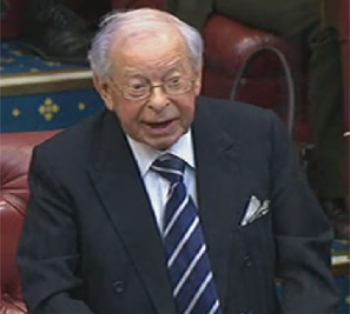Barnett consequentials and the Barnett guarantee
Contents |
[edit] Background
The Barnett formula was first used in 1978, for Scotland, introduced by and named after the then Labour chief secretary to the Treasury, Joel Barnett. It was extended to Northern Ireland in 1979 and to Wales in 1980.
It was meant as a temporary measure to avoid annual negotiations on funding allocations between the UK’s nations. The formula was used to determine the level of UK government spending on public services in Scotland, Wales and Northern Ireland until 1999, when devolution in the UK was brought in under the then Labour government.
Since devolution, the UK Government allocates funding in two ways, either to the UK as a whole, or specifically just for England when the funding is spent on a policy area where the devolved administrations are responsible (including health, education, local government and now Building Safety), block grants of the devolved administrations are set by the Barnett formula.
[edit] The Barnett formula
The Barnett formula refers to the way funding is calculated, effectively the yearly change to the block grant (the largest of the grants provided to the devolved administrations by the UK government) is carried out by a formula which aims to give each nation the same pounds-per-person change in funding each year.
[edit] Barnett consequentials
When additional public expenditure is planned in England, the corresponding additions which are made to the devolved administrations' funding allocations are referred to as Barnett consequentials, aiming to make fair provision to devolved nations of Scotland, Wales and Northern Ireland.
[edit] The Barnett guarantee
The Barnett guarantee, is effectively the same process as the consequentials and formula but as a guarantee it gives devolved administrations increased funding certainty, enabling them to decide how and when to provide support, rather than loans or the traditional Barnett consequentials. The guarantee thus allows devolved administrations to spend additional funding allocated by the Barnett guarantee without having to wait for it to be first spent in England.
The Barnett guarantee was established in July of 2020 as a result of the coronavirus pandemic and requests from the devolved administrations for more borrowing powers that followed. The Barnett guarantee set out how much additional funding the UK Government would provide to each of the devolved administrations to address the pressures of the pandemic in 2020-21. The Barnett guarantee has also been raised in connection to building safety since the Grenfell tragedy and in particular with reference to remediation programmes developed by each of the devolved nations, such as the Scottish Building Safety Levy.
[edit] The Barnett guarantee and Building Safety remediation
The Residential Property Developer Tax (RPDT) was a Corporation Tax supplement levied by the UK Government on the UK’s largest residential property developers,introduced on 1 April 2022. The aim for the tax was to obtain a contribution towards the cost of dealing with defective cladding in the UK’s high-rise housing stock, limited to the largest residential property developers by each group having an annual allowance of £25 million, with only profits from residential property development activities above this amount being subject to the tax.
Only residential development companies liable for UK Corporation Tax fall within scope of RPDT, which is charged at 4% on residential property development profits that exceed their annual allowance. The intention being to raise at least £2 billion from RPDT over a ten-year period, with £200 million generated in the first year. As a UK-wide tax where revenues are used to fund spending on cladding remediation in England, the Scottish Government receive Barnett consequentials, approximately £194 million over the expected ten-year period. The Scottish Government has committed to spending all Barnett consequentials generated from RPDT on cladding remediation in Scotland.
[edit] Related articles on Designing Buildings
Featured articles and news
A case study and a warning to would-be developers
Creating four dwellings for people to come home to... after half a century of doing this job, why, oh why, is it so difficult?
Reform of the fire engineering profession
Fire Engineers Advisory Panel: Authoritative Statement, reactions and next steps.
Restoration and renewal of the Palace of Westminster
A complex project of cultural significance from full decant to EMI, opportunities and a potential a way forward.
Apprenticeships and the responsibility we share
Perspectives from the CIOB President as National Apprentice Week comes to a close.
The first line of defence against rain, wind and snow.
Building Safety recap January, 2026
What we missed at the end of last year, and at the start of this...
National Apprenticeship Week 2026, 9-15 Feb
Shining a light on the positive impacts for businesses, their apprentices and the wider economy alike.
Applications and benefits of acoustic flooring
From commercial to retail.
From solid to sprung and ribbed to raised.
Strengthening industry collaboration in Hong Kong
Hong Kong Institute of Construction and The Chartered Institute of Building sign Memorandum of Understanding.
A detailed description from the experts at Cornish Lime.
IHBC planning for growth with corporate plan development
Grow with the Institute by volunteering and CP25 consultation.
Connecting ambition and action for designers and specifiers.
Electrical skills gap deepens as apprenticeship starts fall despite surging demand says ECA.
Built environment bodies deepen joint action on EDI
B.E.Inclusive initiative agree next phase of joint equity, diversity and inclusion (EDI) action plan.
Recognising culture as key to sustainable economic growth
Creative UK Provocation paper: Culture as Growth Infrastructure.
Futurebuild and UK Construction Week London Unite
Creating the UK’s Built Environment Super Event and over 25 other key partnerships.
Welsh and Scottish 2026 elections
Manifestos for the built environment for upcoming same May day elections.
Advancing BIM education with a competency framework
“We don’t need people who can just draw in 3D. We need people who can think in data.”

























